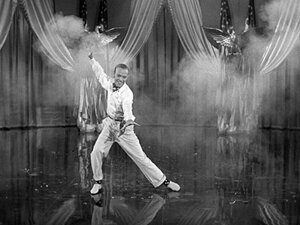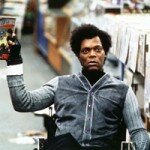As you may have noticed, I’ve been making some changes to Piddleville recently. It’s window dressing, essentially, although I did manage to get around to something I’ve been meaning to do for some time.
Four movies and a post
 Over this holiday period, while I haven’t been posting on any of my sites, neither have I been sitting still.
Over this holiday period, while I haven’t been posting on any of my sites, neither have I been sitting still.
Here on Piddleville, I actually have been adding reviews, though not highlighting them on the home page here.
I hope to rectify that today. So, recently seen …
Holiday Inn (1942)
The movie Holiday Inn is memorable for a number of things, some good, some not so good. To begin with, it brings together a trio made up of Irving Berlin, Bing Crosby and Fred Astaire. Not a bad place to start. The movie itself is a Hollywood soufflé, very light, very unlikely, and quite delightful…
Read more
Unbreakable (2002)
Movies with surprise endings don’t often work well and, even when they do, it’s easy to tire of them quickly. In a sense, they are gimmicky. Done rarely, they’re riveting; done often, they’re tedious. I think M. Night Shyamalan knows this and feels the same way … You get the sense as you watch Unbreakable that he was trying to avoid the surprise ending. On the other hand, you also get the sense that stories of that kind are his natural inclination…
Read more
The Bells of St. Mary’s (1945)
The Bells of St. Mary’s is movie that is very representative of a type of movie Hollywood made in its heyday, very much the way it’s predecessor was, Going My Way. On one hand, it is a type of film that Hollywood has continued to make (like certain Disney films) with varying degrees of success – family oriented and sentimental. On the other hand, it is anachronistic and, for some, nostalgic…
Read more
Now, Voyager (1942)
Here’s a movie that caught me by surprise. It’s another one of those films I went into with little or no expectations. In fact, if anything, I expected it to be a dud. (I had seen a number of older, black and white turkeys recently.) Now, Voyager was wonderful. It’s also an unapologetic soap opera, the kind Hollywood once did so well…
Read more
And now you are up to date. Sort of. More or less. My memory isn’t great; I may have have forgotten something …
Hong Kong: Last of the Road Series
The last of the Road Series, with Bob Hope, Bing Crosby and the always present Dorothy Lamour, was 1962’s The Road to Hong Kong and, as might be expected since it was the last of seven, feels a bit tired, it’s a bit perfunctory and is, at best, a lackluster farewell to a series that was much loved in its day and remains so, at least for some (including me).
It’s essentially going to the well one too many times. That being said, it does have its moments.
The opening, a song and dance routine somewhat akin to a vaudeville number, has Crosby and Hope with strawboater hats, striped jackets, white pants and canes. Singing about teamwork, making jokes obout each other lyrically and visually, it’s a nod to what made the series work, the combination of the two entertainers, but has little if anything to do with the story.
The story, of course, is irrelevant. It’s simply a clothes rack on which to hang the obligatory routines – the chases, the jokes, the songs and so on. They do get to Hong Kong in the movie, at some point, but then they also get into space as well as several other places (including a lamasery). It doesn’t matter since the movie is a series of sketches, essentially, with a number of cameo appearances, such as David Niven in a brief and baffling moment, and Frank Sinatra and Dean Martin.
The best parts of the movie, however, are two other cameos – and they are very good. The movie seems briefly to spring to life, akin to the earlier films, when Dorothy Lamour makes her inevitable. The humour and music really do seem to rekindle the feeling of those first movies. You can see they are older, perhaps less energetic than their younger days, but all three – Hope, Crosby and Lamour – do seem to find the spirit.
The other cameo is the movie’s best scene, and it is fabulous. It’s a hilarious scene with Peter Sellers as an Indian doctor and Sellers completely steals the scene, probably because Hope and Crosby basically sit there, occasionally asking a question or something, being straight men for Seller’s routine. Sellers would play a man from India a few years later in The Party but this character is very different. Whereas in that movie his character is soft spoken, almost completely silent through much of the movie, in Road to Hong Kong he talks non-stop, rather like a car salesmen, trying to make all kinds of offers and deals to get as much money as he can from the Hope and Crosby’s characters.
I wish I knew something about the making of this movie because this scene has an improvisational feel. It plays almost as if the camera started rolling and they let Sellers loose to see what he would do. However it was done, this scene alone almost makes the movie worthwhile. It is very, very funny.
Still, relative to the rest of the film, it may not be enough to lead someone to watch it. I think this is a movie for fans of the Crosby, Hope, Lamour movies. For those people, it’s pleasant enough and certainly nice to see the three together again. Keep in mind that, as with the other Road movies, it’s very silly. The difference between the silliness of the earlier movies and this one is the sense of fatigue The Road to Hong Kong has about it. It lacks the crisp feel of the earlier movies. It’s really more of a tired, nostalgic nod to what went before.
2 stars out of 4.



